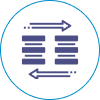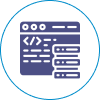PHP frameworks are extensively utilized in India for creating reliable web applications in a variety of
industries. PHP frameworks are popular options for companies of all shapes and sizes because they give web
development projects structure and efficiency. The following are some important sectors where experts in PHP
frameworks are in demand:
With a vast array of online retail platforms, marketplaces, and payment
methods, India's e-commerce sector is thriving and growing quickly. Creating scalable e-commerce
systems requires the use of PHP frameworks like Laravel, WooCommerce, and Magento. Experts in
these frameworks play a crucial role in guaranteeing smooth online purchasing, safe
transactions, and effective inventory control for companies nationwide.
PHP frameworks like Moodle, Laravel, and CodeIgniter are being used by
schools, colleges, and online learning platforms in India, where the education sector is
becoming more and more digital. Robust student portals, educational content management
systems, and learning management systems (LMS) are all made possible by these frameworks.
Education specialists that specialize in PHP frameworks guarantee efficient resource
management, tailored learning solutions, and successful virtual learning environments.
PHP frameworks like Symfony, Laravel, and Yii are used by hospitals,
clinics, and telemedicine platforms in India. Digital transformation is crucial to this
sector. Experts in these frameworks create telemedicine apps, patient management
systems, and electronic health records (EHR). Through technology-driven solutions, they
guarantee safe data handling, adherence to healthcare rules, and enhanced patient care.
CakePHP, Zend Framework, and Symfony are just a few of the PHP frameworks that
cater to the secure and efficient web applications that the Indian financial and banking
industry need. Financial management systems, payment gateways, banking portals, and compliance
reporting tools are all created by experts in these frameworks. To satisfy the strict needs of
the sector, they prioritize strong security measures, smooth financial transactions, and
regulatory compliance.
Using PHP frameworks like Laravel and Symfony, hotels, travel companies,
and tourism websites are all part of India's travel and hospitality sector. Experts in these
frameworks provide tools for planning itineraries, hotel management systems, booking
engines, and travel portals. To meet the various needs of guests and hospitality providers,
they improve user experience, expedite booking procedures, and effectively manage
hospitality operations.
PHP frameworks like Yii, Laravel, and Zend Framework are used by media
outlets, entertainment companies, and streaming platforms in India. Experts in these
frameworks create digital media archives, video streaming services, and content
management systems (CMS). To satisfy the ever-changing needs of the media and
entertainment sector, they concentrate on providing captivating user experiences,
effective content distribution, and monetization techniques.
PHP frameworks like Laravel and CodeIgniter are used by real estate
developers, property management firms, and online property listing platforms in
India. Property managers, real estate brokers, and rental platforms are created by
experts in these frameworks. In the cutthroat real estate market, they improve
client engagement, streamline transactions, and maximize property search features.
PHP frameworks like Symfony and Laravel are beneficial to
manufacturers, dealerships, and service centers in India's automotive sector.
Vehicle management systems, parts inventory software, and automotive e-commerce
platforms are created by experts in these frameworks. To assist India's
expanding automobile market, they improve customer relationship management
(CRM), service operations, and sales processes.
Exclusive list of Interview Questions asked when you PHP Framework Specialist in India
What PHP frameworks have you worked with?
"I have experience with Laravel, Symfony, CodeIgniter, and Yii. Laravel and Symfony are my primary frameworks due
to their robust features and community support."
Can you explain the MVC pattern and how it applies to PHP frameworks?
"MVC stands for Model-View-Controller. It separates the application into three interconnected components: the
model (data and business logic), the view (presentation layer), and the controller (handles user input and
updates the model). PHP frameworks like Laravel and Symfony implement MVC to organize code, improve
maintainability, and facilitate testing."
What are service containers (dependency injection containers) in PHP frameworks?
"Service containers are a key feature of modern PHP frameworks like Symfony and Laravel. They manage the
instantiation and dependency injection of application services and components. They promote modularity, improve
code reusability, and facilitate testing by allowing dependencies to be easily swapped."
How do you handle authentication and authorization in PHP frameworks?
"Most frameworks provide built-in mechanisms for authentication (verifying user identities) and authorization
(granting access based on roles or permissions). For example, Laravel uses middleware and policies for
authorization, while Symfony integrates with Symfony Security component to manage authentication and access
control."
Explain the concept of routing in PHP frameworks.
"Routing maps URLs to specific controllers and actions in MVC frameworks. It defines how incoming requests should
be handled. Frameworks like Laravel use a routes file where developers define routes using HTTP verbs and URI
patterns, which are then matched to corresponding controller methods."
How do you optimize performance in PHP frameworks?
"Performance optimization involves several strategies such as using caching mechanisms (like Redis or Memcached),
optimizing database queries, leveraging asynchronous tasks (with queues like RabbitMQ or Beanstalkd), and
minimizing autoload overhead. Profiling tools like Xdebug help identify bottlenecks."
Describe the database migration process in Laravel or Symfony.
"Database migrations in Laravel and Symfony allow developers to version-control database schema changes. Laravel
migrations use artisan commands to create and manage migrations, which define changes to the database schema in
PHP code. Symfony migrations are managed via Doctrine Migrations, providing similar version control
capabilities."
How would you handle API integration in a PHP framework?
"PHP frameworks offer various approaches for API integration. Laravel, for example, provides Guzzle HTTP client
for consuming external APIs and has built-in tools like API resources for serializing responses. Symfony
integrates with API Platform, a framework for building API-driven applications, offering extensive features for
API development and integration."
Discuss the importance of testing in PHP frameworks.
"Testing ensures code quality, reliability, and maintainability. PHP frameworks support various testing
methodologies such as unit testing (with PHPUnit), integration testing, and functional testing. Laravel, for
instance, includes PHPUnit out of the box and supports testing through HTTP requests using Laravel Dusk for
browser automation."
How do you handle security concerns in PHP frameworks?
"Security is critical in web applications. PHP frameworks mitigate common vulnerabilities by implementing
features like CSRF protection, input validation, SQL parameterization, and output escaping. They also provide
mechanisms for authentication, authorization, and secure session management. Regular updates and adherence to
security best practices are essential."
Frequently Asked Questions
What PHP frameworks are you proficient in?
This question helps gauge the candidate's experience with various frameworks like Laravel, Symfony, CodeIgniter,
etc.
Can you explain the MVC pattern and how it applies to PHP frameworks?
MVC (Model-View-Controller) is fundamental to most PHP frameworks. Candidates should be able to articulate how
each component works within frameworks they've used.
How do you handle database interactions in PHP frameworks?
Look for answers that discuss ORM (Object-Relational Mapping) tools like Eloquent (in Laravel) or Doctrine (in
Symfony), or direct SQL query execution methods.
What are some security measures you take when developing with PHP frameworks?
Answers should include practices like input validation, CSRF protection, SQL injection prevention, and XSS
prevention.
How do you optimize the performance of a PHP application built with a framework?
Look for familiarity with caching strategies (like using Redis or Memcached), code optimization, database
indexing, and reducing unnecessary queries.
Have you integrated third-party APIs with PHP frameworks? Can you give an example?
This question tests practical experience with integrating APIs like payment gateways, social media APIs, or any
relevant examples from their past work.
What are the advantages and disadvantages of using a micro-framework versus a full-stack framework?
This question assesses their understanding of when to use lightweight frameworks like Slim or Lumen versus
comprehensive ones like Laravel or Symfony.
How do you manage dependencies in PHP frameworks?
Answers should mention Composer and its role in managing PHP package dependencies, including installation,
updating, and autoloading.
Describe a challenging bug you faced while working with a PHP framework and how you resolved it.
This question reveals problem-solving skills and persistence in debugging within the context of a framework
environment.


































